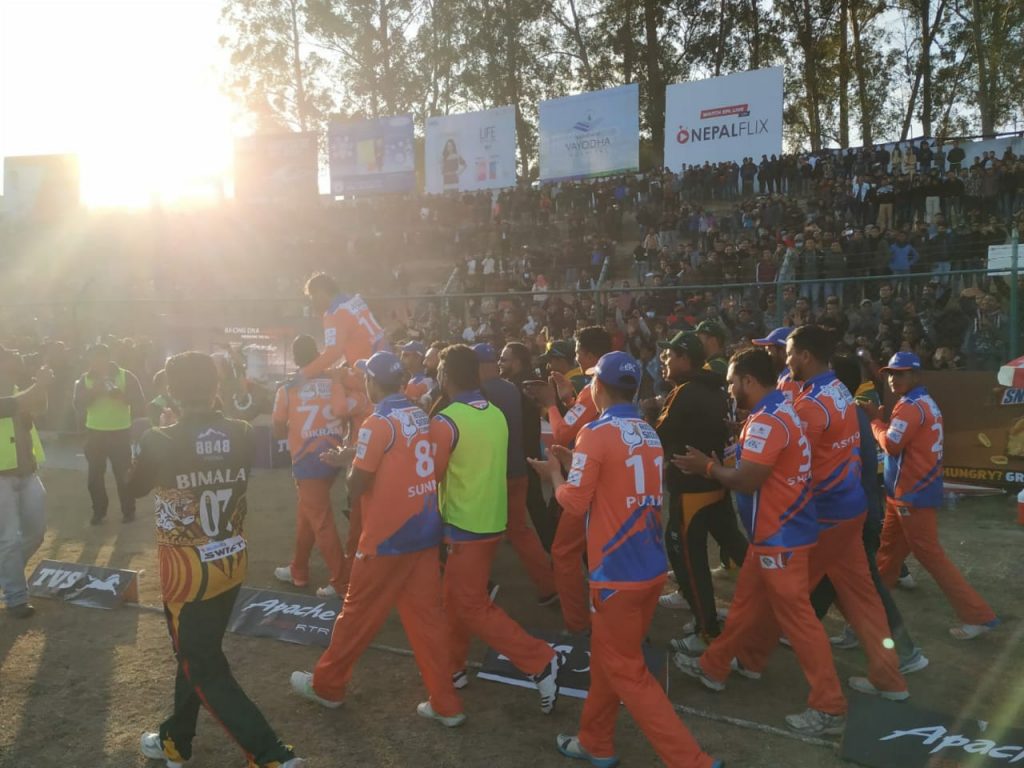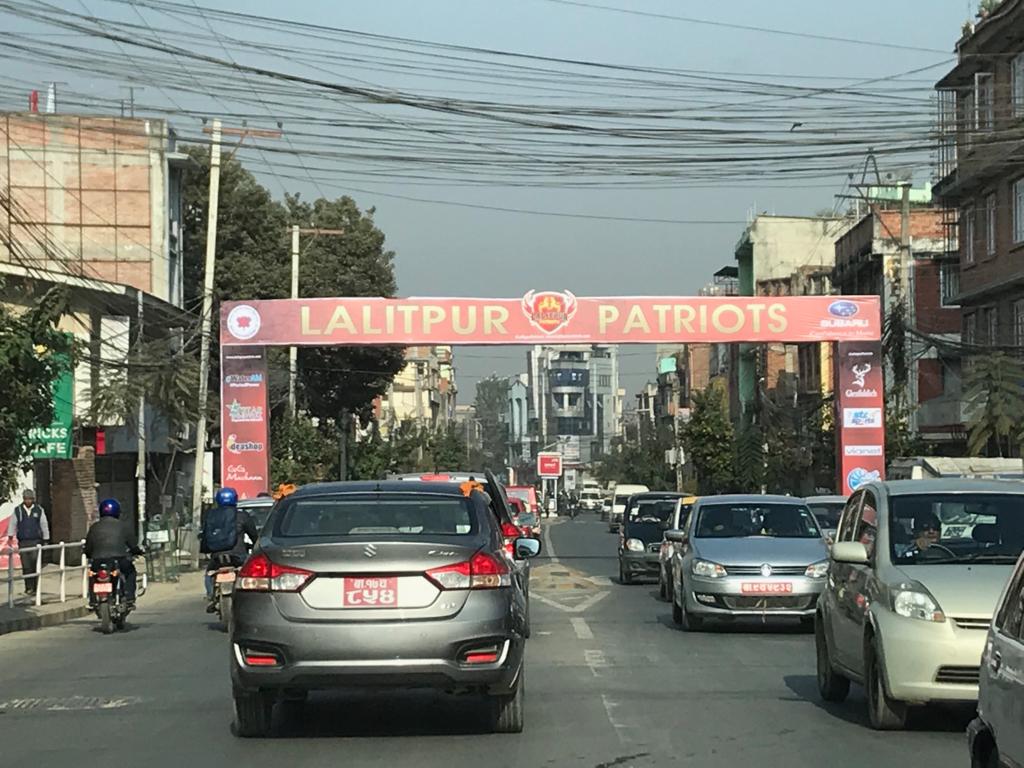Kicking off under the Kathmandu sun in March, the 2020 Everest Premier League (EPL) aims to move into uncharted territory. Avoiding cliches that link Nepal’s mountainous peaks to the upward trajectory of the nation’s progress in the sport, television coverage from DSport in India are poised to deliver a depth and breadth unseen in broadcasting, splashed by the spectrum of high-definition colour.
For organisers and fans alike, the tournament aims to be an advertisement of Nepal and its cricket to the world. Bringing the experience of both international cricket and Full Member T20 franchise leagues, DSport delivers over a dozen cameras ready to capture every moment from multiple angles. Run out appeals will be taken upstairs to a third umpire, with new graphics packages and scoring systems introduced in a necessary, professional facelift for the league compared to previous years.
Founder and Managing Director of the EPL Aamir Akhtar and his team will spend the coming days dealing with rights negotiations to secure coverage around the world, again a pioneering adventure. Previous tournaments have been broadcast live to YouTube and television rights holders’ Facebook pages, with international viewers watching portions of non-English coverage. Sitting down with Emerging Cricket, Aamir believes the polished production will attract viewers across the world, with this attraction, in turn, improving Nepali cricket through the positive publicity.
“Most importantly, we are actually taking our viewership to the India market, and hopefully the whole subcontinent, the Middle East and Europe as well.
“We want our players exposed to the Indian market, to the global market. (Other franchises and leagues) should be able to look at our talent when they watch live on television.”

Franchise leagues have been the defibrillator in Nepali cricket, with the well-publicised issues of politics in the country stifling development. Banned by the ICC for three and a half years, power brokers became sponsors of senior players, as cricketers picked up less than modest pay cheques in multiple leagues among other pop-up tournaments. All but a handful of cricketers had no steady income, with money raised by fans in supporters groups injected into running costs and infrastructure. Rumours arose of players having shares in the various leagues across the country, subsequently tangling them in their own conflicts of interest.
Full interview with Aamir Akhtar can be listened to above or found here.
“It was a demand in Nepali cricket. We were really lagging behind in our cricket setup on a professional platform,” Aamir adds.
“We were struggling with that. We never had the vision, the players were still not getting financially benefited for their hard work and persistence.”
For all of the ad hoc measures taken, the Everest Premier League, now freed from the shackles of being immediate help for players, now sit next to a newly-formed Cricket Association of Nepal. Now working in parallels, Aamir believes the new-found freedom is an opportunity to innovate.
“We worked very hard in those last two iterations without the cricket board. There were a lot of questions about legitimacy, there were a lot of questions about the whole authority.
“But thankfully, the ICC helped us make sure the league was sanctioned for the last two years, and now the cricket board has come into operation. We are again working very closely. We would like to contribute in every aspect to the development of cricket in Nepal.”
Just as the country finds its feet, not all progress is straightforward. Some of the EPL’s regulations, surrounding overseas player eligibility and domestic player transfers, have raised questions. Tying up the tournament with its own red tape, part of the EPL’s success will be mutually exclusive from the progress of other leagues around the country.

Turning its back on foreign players who have graced its tournament and others, the EPL made the bold move of not allowing players who played in the Pokhara Premier League and the Dhangadhi Premier League in the last two years a chance to feature in the EPL.
UAE’s Rohan Mustafa is a player caught in the crossfires of this exclusivity clause. Crowned Player of the Tournament in both the 2019 Pokhara Premier League and the 2018 Dhangadhi Premier League, Mustafa also played in teams that won both tournaments. Despite the undoubted wealth he has brought to his teams and other positives, he is now ineligible to play in EPL 2020. Hong Kong’s Babar Hayat is another player now tied up in red tape.
This move has been met with condemnation, with many pointing out that no grace period had been given to innocent players looking to play competitive cricket and to be paid for their labour. On top of this, holding a monopoly of players means that other leagues cannot rise with the rising tide of cricket in the country. When asked if the EPL is kept on its toes by other leagues around the country, Aamir instead made things clear that the league works on its own plans to ensure their league is regarded as a leader in the emerging game.
“We work on our own plans. Right now we want to be one of the best leagues among the non-Test playing countries.”
Aiming for established Full Member players to meet the “Iconic” player moniker, Aamir confirmed Hashim Amla’s interest in playing at the TU ground, providing a suitable offer was tabled.
“The reason we are trying to attract full member players, I would say the top Test nation players, is because we want to create a legacy with Nepali cricket and we want contributors to Nepali cricket. Kevin (O’Brien) and Richard Levi who played last year, they actually did a lot with the local cricketers. This is what we want from more (Full Member) cricketers.”
Several Nepal national team players also find themselves in transfer deals. Opening a week-long transfer period in early January for Category A players, Sompal Kami and Dipendra Singh Airee found new homes, though curiously, Sandeep Lamichhane’s move from Lalitpur Patriots to the Kathmandu Kings XI was confirmed almost a week after the transfer deadline. It’s a sign that the league, in all of its ambition, still struggles with growing pains.
Like any competition though, its quality will ultimately be gauged by its playing standard, as the mix of Nepali talent and the sprinkling of international players compete at the Tribhuvan University ground. Slow conditions at the ground lead to low scores, though the drama and potential for close games gives the league a winning charm. Three matches went down to the last ball in the last edition, with a super over needed to separate the Pokhara Rhinos and the Biratnagar Warriors in match six. Classic matches in the league’s history prove that modest totals don’t necessarily equal modest entertainment.
Fans packed into the ground are often treated to pulsating cricket no matter the format in Kathmandu, with the MCC’s tour of Nepal in December proof that the popularity is there no matter the format. With a sell-out leading to over ten thousand people turning away from the ground for one of the tour matches, Aamir admits that to take the EPL around the country, and to improve the grounds to facilitate things like night cricket, Nepal needs to harness the power of thousands of fans.
“The current stadium of Kathmandu (the TU Ground) has to be fully-fledged.
“It’s a time for us to capitalise that fanbase in terms of our infrastructure. We need more stadiums outside Kathmandu.”
While no one can fault Aamir and the EPL’s ambition and achievements to deliver quality cricket and television to a country so desperate to keep up with the times of modern cricket, the league sits awkwardly in the framework of developing the game. Does the EPL flex its muscles dominating the market share between franchise leagues, or do they take a more charitable approach in supporting other competitions in the county? Either way, the league is sure to meet the lofty standards of the millions of fans have yearned for, and the addition of experienced international talent could be the best tuition for young players, even if playing legends have just two weeks to impart their knowledge.
Keep up with news and events from cricket’s new world on Facebook and Twitter pages.
Looking for audio content on the emerging game? Add the Emerging Cricket Podcast to your favourites on Apple, Spotify and Podbean.








Well written Daniel, a bit early to analyse but looking at the way EPL is marching forward, other leagues like PPL and DPL need to come up with much better ideas to sustain infront of EPL and CAN proposed #NPL. Looking forward for more articles